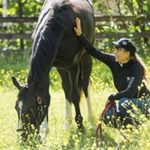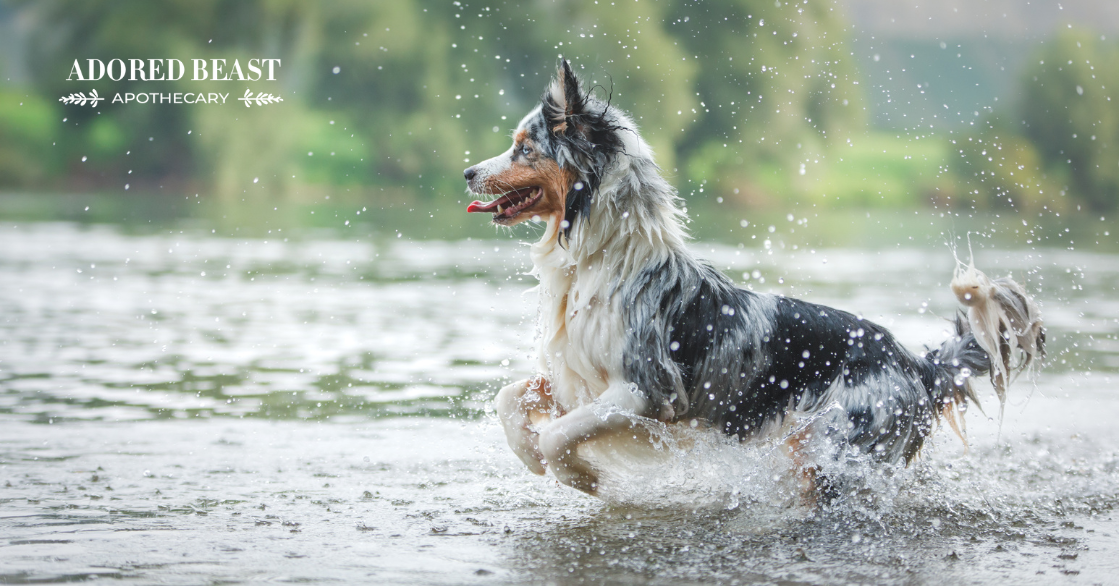Spring is upon us and we can finally warm our faces from that sun shining through. And that means show season is just around the corner! It’s a rejuvenating time of year, one that encourages us to get outside and start training with our horses.
Early in the season, there is a lot of prep that needs to be done ramping up for the shows. It’s kind of like spring cleaning – do the prep now, and you’ll be thankful all season long! To help, I’ve gathered up the best show horse prep tips for a healthier, happier athlete this season.
Spring Season Support
Our horses’ biological clocks work on a circadian rhythm just like ours do. As the days get longer, this changes their metabolism and initiates a lot of changes in your horse. Various metabolic changes will be seen in horses, such as shedding their haircoat, faster hoof growth, and mares going into season.
These changes affect:
- Hormonal pathways
- Histamine regulation
- Liver function
- Musculoskeletal gene expression
- GI function
Support is necessary for this significant shift in their cellular function.
So let’s dive right in with some show horse prep hacks that will support your horse immensely through the show season!
Show Horse Prep Tips
1. Stress Reduction
Travelling/trailering, moving to a new facility, new objects, new horses, etc., are all stressors for horses. We need to support them so that while they are showing we are reducing cortisol which increases the risk of inflammatory processes and ulcer formation. This is a daily practice rather than just at the shows:
- Match training exercises to goals – slowly and steadily working towards goals. Don’t show at a higher level than your horse is comfortable with at home.
- Plan outings before you start competing. Ideally at the venues you are showing at but lots of outings, going on the trailer, having good experiences, and then coming home.
- Matching diet to training goals – give access to lots of forage at new places. This reduces stomach acid and stress!
- Support your horse’s gut – always! Gut support is better than health insurance! Focus on immune modulation for every system.
2. Non-Toxic Grooming Supplies
Go chemical-free wherever possible!
1. Pesky Pests
Spring brings with it those pests we all have to deal with. But when it comes to our horses’ health, there’s a right way to deal with them that doesn’t harm our loved beasts. With your fly spray – eliminate pyrethrins!
Pyrethrins – Insecticide/neurotoxic ingredient added to conventional fly sprays
Humans and animals can experience dizziness, headaches, digestive upset, muscle twitching, low energy, changes in awareness, convulsions and loss of consciousness (CDC website). A study published in Chemosphere (conducted by the Department of Entomology, University of Nebraska) showed that pyrethrins affect honey bee movement (slowing them down) and lowers their social interaction/behaviour
Commonly used pyrethrins in equine fly sprays:
- cypermetherin, permethrin, and resmethrin is highly toxic to honey bees
- piperonyl butoxide combined with pyrethrin is toxic to bees
Alternatives:
- neem oil – highly effective against mosquitoes (2% concentration)
- aromatherapy oils recognized by Health Canada as insect repellants – eucalyptus, lemon & other citrus, geranium, pine, fir, camphor (rosemary)
- apple cider vinegar – acetic acid is a natural insect repellant
My favourite natural and effective fly spray.
2. Hoof Oils
Eliminate harsh chemicals, eg. formaldehyde/formalin and gentian violet (carcinogenic according the FDA & Health Canada).
Formaldehyde/Formalin– found in some hoof treatments designed to harden the hoof
Important! Soft feet are more than just a localized issue! Often times, soft feet are a result of nutritional deficiencies and environmental conditions, including wet ground and also long term stress. Though the hoof is hard, it is still permeable and topical hoof treatments can reach the blood stream. Formaldehyde/Formalin are scientifically linked to nasal, lung, brain and blood cancers in humans, and short term exposure can also cause acute organ toxicity, respiratory difficulty, eczema, skin burns and sensitization.
Gentian Violet – found in thrush treatments – antiseptic/antifungal
Health Canada has issues a recall/warning to stop using it due to serious risk of cancer in humans and animals.
My favourite hoof oil and hoof balm.
3. Bit Balms/Lubricants
Eliminate petroleum products.
Petroleum Products /PAHs (polycyclic aromatic hydrocarbons) – often used as bit balm/lubricant in horses. Eg. Vaseline – petroleum product
PAHs – probable carcinogens that can affect the microbiome of mucosal membranes.
My favorite bit balm/girth salve.
4. Shampoos
Use castile or coconut-based soap that does affect the microbiome. We tend to over-bathe horses during show season – this can set up your horse for skin bacterial and fungal issues like sweet itch, mud fever, and rain scald.
3. Nutrition
Feed vs Forage – turf the processed feed and use real food instead. eliminate glyphosate / herbicides / aphlatoxins (mould toxins from stored grains/legumes) – corn, oats, alfalfa, beet pulp, wheat, soy
Have a regular hay analysis done, and make sure you know what you’re feeding in terms of sugar, fibre and mineral content with your forage so you know how to complete the diet.
Blood mineral and vitamin analysis is also important. Making sure your horse is absorbing nutrients from their diet and seeing if there are any supplements or diet changes indicated is essential.
Feed a variety of nutritive herbs. Variety in plant matter increases your horse’s nutrient profile dramatically!
Horses are master herbalists; they know how to eat seasonally, but most horses don’t have this luxury anymore and it really limits their nutrient profile. These are specifically for stress:
- Dandelion leaf and root – supports: digestion, bile secretion, liver/kidney function and inflammatory modulation. Cost-effective, nutritive and medicinal.
- Ashwaganda – adaptogenic herb. Supports: stress reduction, antioxidant. Long term studies show that it is safe to use for long periods of time, especially for the whole show season. Oxidative/inflammatory stress/protective, calming herb for mental stress.
- Licorice root (DGL) – supports: intestinal mucosa, circulation/oxygenation, liver repair and intestinal cell repair
- Marshmallow Root – supports: skin, respiratory, digestive and urinary systems. High in mucilage, feeds the gut lining – protects against ulcer development.
- Medicinal Mushrooms – adaptogenic, inflammatory reduction, blood sugar support (chaga), metabolic support, nervous system support (lion’s mane), reishi (stress/calming the nerves, immune system support), turkey tail – GI support and inflammatory reduction
Nutraceuticals
- Omega 3s – soaked chia, fresh ground flax, camelina oil – NOT fish oil – digestive support, hormone support, inflammatory modulation (esp. joints and circulatory system), skin, eyes, hair coat and hooves.
- Probiotics – a variety of strains along with variety in pre-biotic fibre – supports: immune, metabolism, kidney, nervous system and digestive function
- NAG (N-acetyl glucosamine) – plant-derived source – supports interstitial linings – uterus, gut, bladder, lungs, organs
- L-Glutamine – Supports: repair of the intestinal/mucosal lining of the gut
- Vitamin E – liquid form – d-alpha tocopherol – supports as an antioxidant and stress/hormonal/inflammatory support
Extra Show Horse Prep Tips
Make sure you’re providing adequate minerals! If you’re not sure, do that blood and hay analysis.
Do a stress assessment that considers training/housing, trailering, diet, routine. Do this with a professional if you need a third party opinion.
Again, eliminate glyphosates, sugar, and starch from the diet. These are found primarily in processed feeds. This helps to reduce metabolic, GI, and inflammatory stress.
Employ homeopathy – a gentle and effective aid that will not test at horse shows and helps with emotional and physical stress – energetic rather than crude substance dose.
- Arnica – anti-inflammatory/trauma care
- Aconite – anti-stress/trauma care, anxiety
- Caledundula – fast healing for joint, ligament, musculoskeletal and skin tissues
- Sympytum – bone support
- Ruta – joints and ligaments, sprains and strains
Use up to 5 times daily on show days, both as a preventative and at horse shows.
I want to wish everyone a great show season and don’t forget to have fun!!!!












